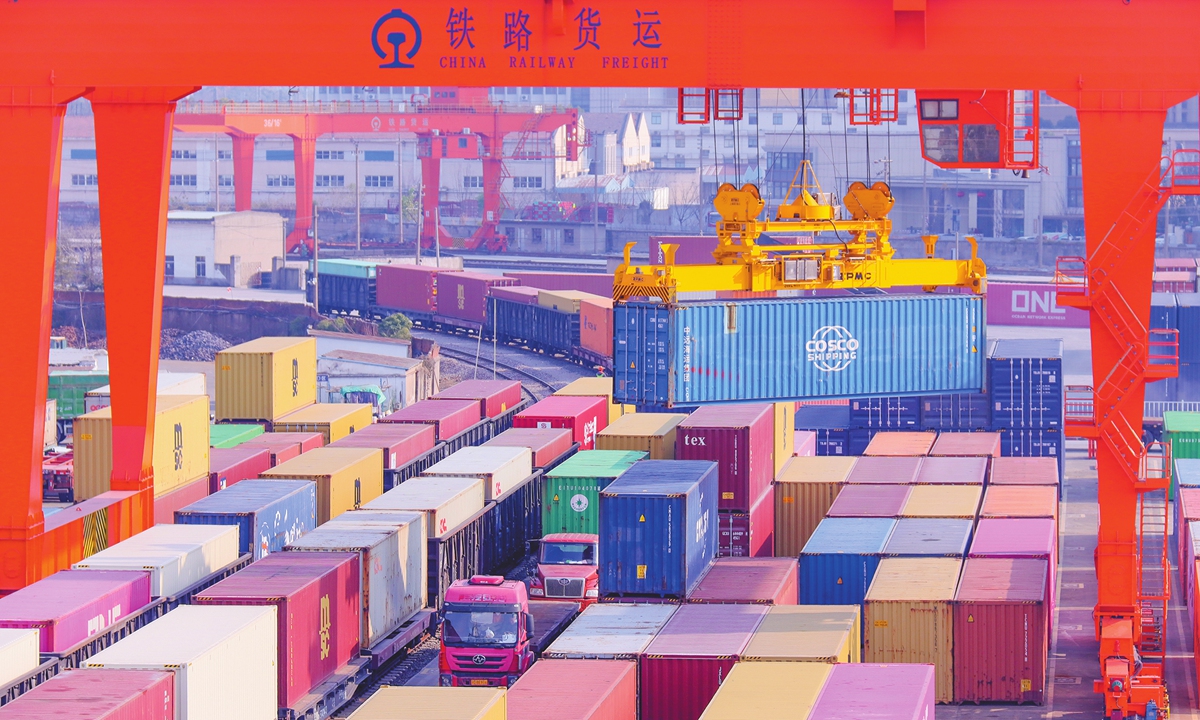
A crane handles a container at a railway freight yard at Changzhou, East China's Jiangsu Province, on January 2, 2025. Photo: VCG
A rapid container cargo train left South China's Guangzhou bound for Chengdu, capital of Southwest China's Sichuan Province on Monday, as the first demonstration rapid rail transportation channel was officially launched, according to state broadcaster CCTV.
The train service was launched as the country strives to slash logistics costs and boost up internal circulation.
The train departing daily from the Guangdong-Hong Kong-Macao Greater Bay Area will operate at a top speed of 120 kilometers per hour, with an average speed of 70 kilometers per hour, across its 31-hour journey to Chengdu.
The rapid service will be 21 percent faster than current cargo trains in the same league, according to CCTV. The report said the service is expected to improve goods transportation efficiency, cut logistics costs and offer better support for the coordinated economic development between Guangdong and Sichuan.
Also on Monday, a rapid cargo train left Beijing for Guangzhou, with another leaving Hefei in East China's Anhui Province for Chengdu, both are part of the rapid cargo train services aimed at linking China's various city clusters, according to a press release by the China State Railway Group on Monday.
China State Railway Group noted that the initiative aims to make the operation of railway cargo transportation more market-orientated and more like that of passenger trains. The initial batch includes six rail links between China's city clusters.
These trains can travel at a top average speed of 73 kilometers per hour and traverse a distance of 1,750 kilometers a day, the railway operator said.
The Chinese government in November issued an action plan aimed at reducing logistics costs and boosting economic efficiency, targeting a reduction in the ratio of social logistics costs to GDP to around 13.5 percent by 2027, per a government notice. The Xinhua News Agency reported that this would lower the cost from 14.4 percent in 2023 and 18 percent in 2012.
The plan seeks advancements in integrated transport reforms, optimizing freight transport structure, and increasing the share of railway freight volume and railway freight turnover to 11 percent and 23 percent, while boosting rail-water intermodal port container transport, according to the notice.
Sun Zhang, a railway expert at Shanghai Tongji University, told the Global Times on Monday that the transport of "white goods" such as home appliances in addition to the traditional "black goods" such as coal will be a new growth point for the country's railway sector.
The development also came as the country steps up support for the development of its western regions.
On Sunday, China's General Administration of Customs
unveiled 15 measures aimed at advancing the large-scale development of the country's western regions, including support for the opening or expansion of ports in eligible areas in need, and the exploration of further measures to facilitate intermodal river-sea and rail-sea transportation.




